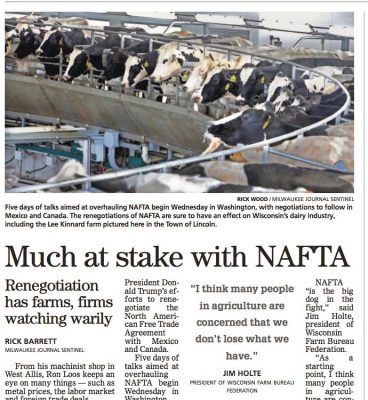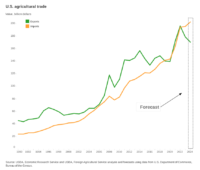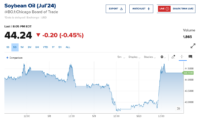Bloomberg's Clarice Couto reported this past Friday that "a surprising tax change in agriculture powerhouse Brazil has the potential to make soy grown in the world’s largest bean exporter less…
NAFTA 2.0: Renegotiations Begin
Background
William Mauldin and Paul Vieira reported earlier this week at The Wall Street Journal Online that, “The Trump administration launched the renegotiation of the North American Free Trade Agreement Wednesday by laying out a starkly different vision from that of its two continental trading partners of how the pact has worked and how radically it should be rewritten.
“The wide gap between the administration’s opening rhetoric and the positions of Mexico and Canada suggests a difficult road ahead in redoing the 23-year-old accord, even discounting for the posturing at the opening of any negotiation.”
The Journal article noted that, “[U.S. trade representative Robert Lighthizer] said Mr. Trump, who vilified Nafta in the 2016 presidential campaign, isn’t interested in just modernizing the pact and ‘tweaking’ commercial rules, but rather wants new features to reduce the U.S. trade deficit with its two neighbors.”
ICYMI: Watch the #NAFTA 2.0 opening speeches here: https://t.co/xEmIk4ALsq pic.twitter.com/xLcvOan4S6
— USTR (@USTradeRep) August 17, 2017
Mauldin and Vieira added that, “Mr. Lighthizer pointed to Nafta’s success for many U.S. farmers, but he said it has hurt many others.”
The Journal article also indicated that, “Officials hope to hold several rounds of talks this fall and complete negotiations as soon as early next year, before the political season heats up in Mexico and the U.S. Following the current first round, officials are expected to meet in coming weeks in Mexico City for the next round.”
#Nafta renegotiation officially begins. Hard to say when or how it will end, but the goal is by early next year. pic.twitter.com/DBebDY2hIa
— William Mauldin (@willmauldin) August 16, 2017
Binyamin Appelbaum explained on Wednesday at The New York Times Online that, “Mr. Trump also will need to win congressional support for a revised agreement. Democrats, who have long sought changes to Nafta, share many of his stated goals, but Mr. Trump’s political problems could complicate any alliance.
There is also little if any congressional support for the administration’s threat to withdraw from the trade agreement if Canada and Mexico resist improvements.
Meanwhile, an update posted on Thursday at The Economist Online (“The North American Free-Trade Agreement renegotiation begins“) pointed out that, “The need for speed will probably oblige negotiators to sacrifice some of their ambitions. Complicated areas such as services or intellectual property may be jettisoned, or shallow agreements reached. Resolutions for historically difficult disputes, such as between America and Mexico on sugar, or between America and Canada on softwood lumber, may have to wait.”
And Financial Times writers Shawn Donnan and Jude Webber noted this week that, “Neither Canada nor Mexico nor the vast bulk of American business wanted to reopen Nafta. The main reason for that, beyond economics, was the political risk. And that has not gone away. If a deal is struck, it is unclear if it could survive a vote in Congress. Democrats are almost certain to oppose anything negotiated by the Trump administration, seeing his softening on trade as a political weak spot. Many pro-trade Republicans are also uncomfortable with some of Mr Trump’s demands.
If a deal collapses or the president again threatens to withdraw from Nafta, he would face a revolt from Republicans in farm states and the business community.
Along these lines, Shawn Donnan reported at The Financial Times on Wednesday that, “The head of Cargill has warned Donald Trump that he risks making a ‘destructive’ mistake for the US economy and American workers if he walks away from the North American Free Trade Agreement.
“David MacLennan, chief executive of the world’s largest agricultural commodities supplier, urged the US to focus on improving a 23-year-old trade agreement that overall had been of great benefit to the US and neighbouring Canada and Mexico.”
The FT article reminded readers that, “In April Mr Trump decided against withdrawing from Nafta after intense lobbying by business and from within his own cabinet. But the president has since then repreatedly threatened to pull out if there is not deal that he deems ‘fair’ for American workers.”
“‘I think that would be a big mistake,’ Mr MacLennan said of a US exit from Nafta. ‘I don’t see that as an option, as a viable option.'”
Agricultural Issues
Milwaukee Journal Sentinel writer Rick Barrett reported this week that, “American farmers want Canada to ease restrictions on U.S. dairy products, and they also fear losing easy access to the Mexican market.”

The article noted that, “U.S. pork producers are among NAFTA’s biggest supporters.
“‘Canada and Mexico are top markets for our pork, so obviously we don’t want any disruptions in our exports to those countries. We need to keep pork trade flowing,’ said Ken Maschhoff, president of the National Pork Producers Council.
“One of every nine tanker loads of milk from Wisconsin ends up in dairy products out of the country, with much of it going to Mexico.”
Remaking Nafta, "Dairy Trade Flow (U.S., Canada)"- https://t.co/HC3IEytaJE pic.twitter.com/8pMzwIKky7
— Farm Policy (@FarmPolicy) August 16, 2017
Mr. Barrett explained that, “Earlier this year, dozens of Wisconsin dairy farms were nearly forced out of business when they lost their milk buyer following a trade dispute with Canada.
“Dairy trade with Canada is sporadic, said Mike North, president of the Dairy Business Association based in Green Bay.
‘We find ourselves in an ongoing pickle of trying to figure out how we can sell products in Canada, North said.
Meanwhile, the Peterson Institute for International Economics published a paper last month (“A Path Forward for NAFTA“) that included a chapter on agricultural issues written by Cullen S. Hendrix.
In part, the paper noted that, “This chapter makes four points related to the role of agricultural interests in any NAFTA renegotiation:
- Despite agriculture’s comparatively small contribution to GDP in all three countries, agricultural issues will be a thorny aspect of these negotiations—just as in other FTA negotiations.
- US and Canadian agricultural producers like NAFTA and will fight hard to preserve it. Aside from some wrangling over market access issues for dairy, poultry, and eggs and recent spats over Canadian soft lumber, farm organizations in both countries view NAFTA positively. Public opinion in Mexico is more ambivalent, but NAFTA has created strong export-oriented agricultural interests in the country’s north that balance more protectionist interests in the south.
- Despite not being as extensive as those in other industries, NAFTA has created complex cross-border agricultural supply chains that create value added for the US economy, particularly in GOP-leaning states.
- Disruptions to NAFTA could create big problems for Trump-voting states and states with GOP and split Senate delegations, especially those that rely heavily on agricultural exports and intra-NAFTA trade.”







